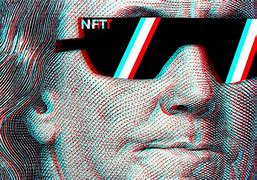
The recent years led to a rise in cryptocurrency and NFTs. But what is the “crypto hype” about and why is there so much controversy regarding it? NFTs, short for non-Fungible tokens, establish exclusivity for digital content, thereby facilitating a new form of transparent digital ownership. This means that, although two “tokens” may be similar, each one is unique and not interchangeable. Along with this form of cryptography came the new art form of crypto art. Thus, NFTs pose a lucrative and equitable business model for artists, enabling them to sell their work as digital goods that can be bought, sold, traded, and collected. For example, NFTs can include photos, graphic images, videos, and music.
However, despite all positive aspects, NFTs are often criticized and associated with an emerging “scammer” culture. Therefore, so-called grifters have manipulated the prices of NFTs through fraudulent activities such as self-dealing and creating/ selling NFTs based on stolen art. Furthermore, they advertise the projects as promising long-term visions that provide exclusive access to future NFT drops, special events or rewards, or the ability to stake NFTs in a project’s ecosystem for a chance at earning profits. However, after the NFT sale is completed, the project often disappears, leaving buyers with worthless NFTs and no way to recoup their investment. This problem is exacerbated by the fact NFT transactions are designed to be decentralized, making it impossible for a third party to reverse any illicit transfers that may occur.
In conclusion, although NFTs provide artists the platform to sell their creations digitally, their design also makes them susceptible to criminal behavior. In 2022 alone, NFT thefts resulted in losses exceeding $100 million. This highlights the need for buyers and sellers to be careful when engaging in NFT transactions and to take steps to verify the authenticity and legitimacy of the NFTs being sold or purchased.





Anyone who has played the game CSGO can see why NFTs are little more than a scam. In CSGO, you can spend real-life money to open boxes that have potentially hundreds or even thousands of times the value in return, which you can also sell to someone else or a third party for real-life money. What you get from boxes are skins, and each skin has a unique number of wear and tear to it despite there being many similar skins. Sounds similar? The problem with these skins/NFTs is that these items, the “coins”, of this system are not associated with any real-life economic activity which means all transactions are within, therefore often subject to third-party manipulation. Another problem is that these NFTs are not associated with any uses, while the skins in CSGO can be used, therefore they give motivations for purchase rather than purchasing simply for the idea of gaining in value.
It is also worth noting that the creation of NFTs requires an extremely alarming amount of computing power that is absolutely not helping our current global climate crisis. A word of warning about cryptocurrency as well; although the dream of a decentralized currency system has noble origins and ideologies, it is, as with any other currency system, largely controlled by those who have the most resources to begin with. With the added downside that decentralization means nobody can help you if it gets stolen or if you are scammed.